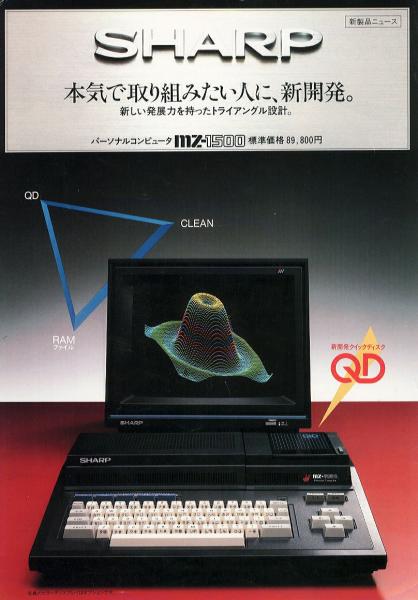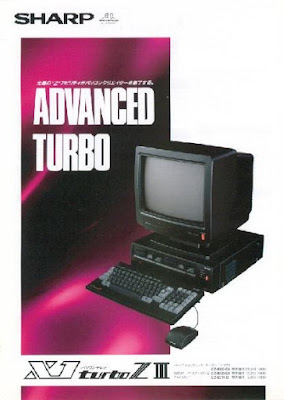Sharp
La gente
conoce más o menos los X68000 muy poco los X1 y lo anterior es totalmente
desconocido, y más si hablamos de España. Que los sacas de los: Atari, Commodores,
Msx, o similares y directamente nadie tiene ni remota idea de nada.
La gente se
cree que Japón no tiene ordenadores anteriores a los 16 bits o como mucho el Msx.
Craso error! un X68000, un Fm Town y un Pc98 tienen, abuelos, bisabuelos y
tatarabuelos, y no uno ni dos, docenas y docenas de ellos.
Yo conozco
algunos pero es un follón increíble de máquinas y especificaciones a mí
personalmente no me gustan. En realidad ya los Amigas o Atari me parecen
productos totalmente infames.
Aquí estamos hablamos
de ordenadores anteriores a 1980 en muchos casos. Técnicamente para jugar
la mayoría no valen.
Ya en la
época del Msx muchos eran 16 bits. Realmente estaría bien que la gente
aprendiera cincuenta años después que una Cpu sino está rodeada de lo
necesario, es totalmente inútil para juegos, es un motor sin coche, pero bueno,
contar aquí eso es explicar literatura a las cabras.
Si entrara
en datos técnicos estaría escribiendo dos años. Básicamente voy a dar un vistazo
por encima y SOLO a Sharp. Si me meto en Nec y otros directamente seria
inacabable ya solamente lo de Sharp es increíblemente extenso.
La primera
serie de Sharp, que además se vendió, más o menos en Europa.
- MZ-80K series
- MZ-80K2(1980): The assembled version of the 80K.
- MZ-80K2E(1981): Versión de bajo precio 80K2.
MZ-80 B (1982)/MZ-1200: An upgraded version of the 80K with improved keyboard, more VRAM and a green-screen VDU.
-
- MZ-700 (1982): The first MZ without a built-in monitor; an optional data recorder and plotter could also be installed to the machine. More-or-less fully compatible with the MZ-80K.
MZ 1200
- MZ-1500 (1984): Available in Japan only. Features 320×200-pixel graphics and built-in sound capability using a Texas Instruments SN76489 sound chip. The tape recorder has been replaced with a floppy drive that reads 2.8-inch Quick Disks.
- MZ-800 (1985): The first MZ with a 640×200-pixel graphics mode and a Texas Instruments SN76489 sound chip.
MZ-80B series.
- MZ-80B (1981): 320×200-pixel graphics. (Extra VRAM optional)
- MZ-80B2: An 80B with extra VRAM installed. Sold alongside the MZ-2000 for most of the lineup's lifetime.
- MZ-2000 (1982): 640×200-pixel monochrome monitor built-in; color optional. BASIC-level compatible with the MZ-80B.
- MZ-2200 (1983): The only monitorless, standalone unit in the series.

- MZ-2500 (SuperMZ) series: Launched in 1985, the computers in this series all used a Z80B processor running at 6 MHz. They included a data recorder and at least one 3.5 internal floppy disk drive, as well as a YM2203 FM sound chip, hardware scrolling, and a palette of 256 colors (upgradable to 4096). This makes them among the most powerful 8-bit machines ever released for home use. Some models are also compatible with the MZ-80B and MZ-2000.
-
- MZ-2511
- MZ-2800 series
MZ-3500 (1982).
A line of business PCs shoehorned into the MZ lineup. All of them feature 5.25-inch floppy disk drives.
- MZ-3500 series (1982): Runs on two Z80A processors.
- MZ
- MZ-3541: FDOS and EOS (CP/M compatible)
MZ- 5500/6500 SERIES (1983).
16 BITS CPU.
- MZ-5500/6500系列
- MZ-6500 - 1984 vELOCIDAD 8 MHz

- MZ-6541 - 5.25 650,000円。
- MZ-6545 - 5.25 998,000円。PRIMER MODELO CON HDD.
- MZ-5600 - MZ-6500の海外モデル。
- Como se ve esta serie llegó a europa.
-
- MZ-6541C - 5.25.
- MZ-6550 - 80286 CPU、縦置き筐体。
- model 50 - 3.5 DISQUETERAS
MZ-6556.
A partir de aquí nos metemos con la generación de X1.
X1(CZ-800C/1982年11月)
X1C(CZ-801C/1983年10月)
X1D(CZ-802C/1983年10月)
X1Cs(CZ-803C/1984年7月)
X1Ck(CZ-804C/1984年7月)
X1F(1985年7月)
X1G(1986年7月)
X1 twin(CZ-830C/1987年12月)
De este ya he hablado tiene una pcengine incorporada, tal vez algún día me haga con uno...
X1R(1984年)
Este es un modelo un tanto especial porque se basa en los coches nissan skyline gtr.
X1DX(1985年12月)
X1DII(1986年2月)
Este es un modelo un tanto especial porque se basa en los coches nissan skyline gtr.
Aparece la serie x1 turbo.
X1turbo(1984年10月)
X1turbo model40(CZ-862C/1985年7月)
X1turbo II(CZ-856C/1985年11月)
X1turbo III(CZ-870C/1986年11月)
Y ya la última serie de x1, los turbo z.
Supone mucho
tiempo y esfuerzo hacer estas entradas. Y son densas y largas, y eso que no me
pongo a explicar nada, porque si no me estoy media vida.
Si veo que
interesa igual me pongo con otras compañías, aunque solo de pensar en Nec que
multiplica esto por mil me entran
sudores fríos...
Fujitsu, Casio
y alguna más tienen catálogos similares a Sharp.


















































































